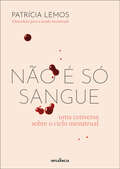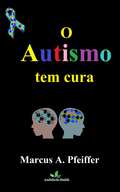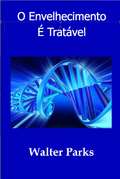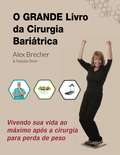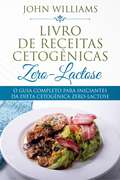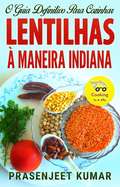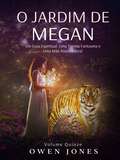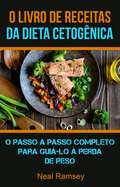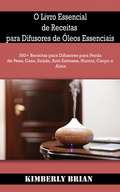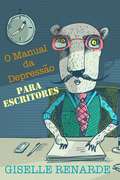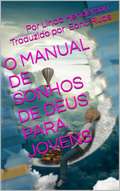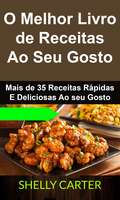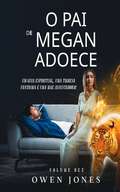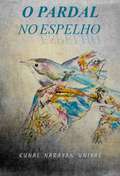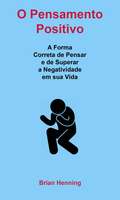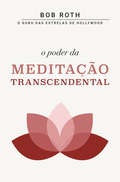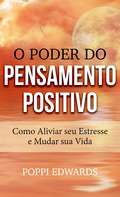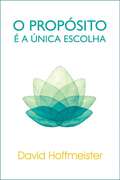- Table View
- List View
Nya's Long Walk: A Step at a Time
by Linda Sue ParkIn this picture book companion to the beloved bestseller A Long Walk to Water, a young South Sudanese girl goes on a journey that requires determination, persistence, and compassion.Young Nya takes little sister Akeer along on the two-hour walk to fetch water for the family. But Akeer becomes too ill to walk, and Nya faces the impossible: her sister and the full water vessel together are too heavy to carry.As she struggles, she discovers that if she manages to take one step, then another, she can reach home and Mama’s care.Bold, impressionistic paintings by Caldecott and Coretta Scott King Honor winner Brian Pinkney evoke the dry, barren landscape and the tenderness between the two sisters.An afterword discusses the process of providing clean water in South Sudan to reduce waterborne illness.
Não É Só Sangue: Uma Conversa Sobre o Ciclo Menstrual
by Patrícia LemosO ciclo menstrual é reflexo da sua saúde. Aprenda o que o seu corpo lhe está a querer dizer. Além das questões menstruais, o livro ajudará as mulheres a compreender o importante conceito de literacia de corpo: que se traduz na capacidade de interpretarmos os sinais que o corpo nos dá e capacitar-nos no sentido de nos permitir tornarmo-nos uma autoridade nos nossos próprios assuntos. Porque é que precisa de um livro sobre ciclo menstrual? O mais provável é que seja diferente do que aquilo que lhe contaram. Para algumas pessoas, a menstruação é a chatice que aparece de quando em vez; para outras, não incomoda assim tanto. Mas para todas as pessoas que menstruam: o ciclo menstrual é informação. Patrícia Lemos, educadora para a saúde menstrual e fertilidade, ajuda-nos a compreender o nosso ciclo menstrual e a olhá-lo como um indicador de saúde, sempre — e não apenas quando se pensa em ter bebés. Neste livro, descobrirá que:· No ciclo menstrual, o mais importante é invisível aos olhos. · Ovular faz-nos falta, mesmo quando não queremos engravidar. · A expressão do período (cor, consistência, cheiro, duração) fornece pistas sobre a nossa saúde.· Num pico de fertilidade, as probabilidades de conceção são de cerca de 20% a 25% a cada ciclo. · A TPM tem tratamento, e não é suposto existir. · A síndrome dos ovários poliquísticos é uma condição crónica, não se cura com a pílula e não se diagnostica apenas com uma ecografia.· A endometriose é uma condição de saúde séria e estrogénio-dependente. · Infertilidade e subfertilidade são coisas distintas.
O Autismo tem cura
by Marcus Pfeiffer Renata Campos J. PintoO autismo é bem mais comum do que muitas pessoas pensam. Os últimos estudos nos mostram números chocantes. Pior do que isso, podemos ver um aumento constante de crianças diagnosticadas com autismo. Como se não bastasse, quando visitam médicos e pediatras, os pais ouvem que o autismo é uma enfermidade mental sem cura e que precisam aprender a conviver com isso. Permita-me dizer a verdade, a recuperação do autismo não é simples. E como poderia se o próprio autismo é um transtorno tão complexo? Contudo, ele definitivamente é curável. Vou repetir mais uma vez: O autismo tem cura Não se deixe enganar pelas declarações dos cientistas e especialistas. E acima de tudo, não permita que ninguém te desencoraje. Principalmente se você acredita em Deus, você precisa saber que Ele já criou a cura para todas as doenças.
O Completo guia do ÓLEO CBD para o ALÍVIO DAS DORES
by Sandra Moore Eliane CarvalhoO Completo guia do ÓLEO CBD para o ALÍVIO DAS DORES: Um guia com o passo a passo para iniciantes com informações a respeito do ÓLEO de CANABIDIOL para o tratamento natural e eficaz para diversos males. VOCÊ ESTÁ SOFRENDO COM DORES CRÔNICAS, ARTRITE REUMATOIDE, FIBROMIALGIA, ESCLEROSE MÚLTIPLA, DORES NA COSTAS E NO PESCOÇO, ANSIEDADE E DEPRESSÃO, OU OUTRAS DOENÇAS QUE O IMPEDEM DE VIVER SAUDÁVEL E FELIZ? Em caso afirmativo: provavelmente você está tomando medicamentos como o ibuprofeno para ajudá-lo no alívio das dores, mas com os terríveis efeitos colaterais desses medicamentos a sua saúde piora a cada dia. Você não precisa sofrer com isso! Com os benefícios do CANABIDIOL ÓLEO que foi pesquisado, testado e comprovado pelos cientistas, você conhecerá os incríveis resultados nos processos de: inflamações, dores crônica, combate a depressão, ansiedade e melhoria na qualidade de vida. Este livro:" O completo guia do óleo CBD para ALÍVIO DAS DORES." Um guia com o passo a passo para iniciantes, com informações a respeito do ÓLEO de CANABIDIOL para o tratamento natural e eficaz de diversos males, alívio de dores sem o uso de medicamentos. O melhor guia sobre o óleo CBD, com informações detalhadas sobre como fazer uso do CANABIDIOL, acompanhado de um guia explicativo para a compra do óleo de CBD de forma precisa sem desperdiçar recursos, e também as pesquisas comprovadas e os testemunhos de usuários do CDB para várias condições de saúde e muito mais. Tudo o que você precisa saber para superar as dores está aqui, não coloque sua vida em risco com medicamentos! Abrace esta maravilha, o ÓLEO natural que pode ser a cura para diversos males. O óleo de CBD é a resposta! Não perca tempo, clique no botão "Comprar" adquira já!
O Envelhecimento É Preventível: Em Busca da Eternidade Com Hormonas & Telómeros
by Walter ParksO acompanhamento das novas descobertas científicas e o Projeto Genoma Humano, em particular, um estudo dedicado aos genes humanos, permitiram aprofundar de forma mais sucinta as causas para o envelhecimento, enquanto vão sendo providenciadas cada vez mais pistas acerca das melhores formas de prevenção contra esta ocorrência. Sabemos que existem duas causas principais que desencadeiam o envelhecimento: a redução dos genes dos telómeros, as extremidades dos nossos cromossomas, sempre que ocorre o processo da multiplicação celular, e a diminuição dos níveis hormonais à medida que vamos envelhecendo. Foram formulados testes que comprovam que é possível atenuar este processo e, potencialmente, evitar a ocorrência do envelhecimento precoce. Este livro descreve os processos que desencadeiam o envelhecimento e identifica meios aos quais poderá recorrer para prevenir e, eventualmente, reverter os efeitos provocados pelo envelhecimento precoce.
O Envelhecimento É Tratável
by Walter ParksOs novos avanços na ciência médica e a descoberta do genoma humano estão a fornecer novos conhecimentos acerca do processo de envelhecimento. Agora podemos aumentar significativamente a nossa longevidade saudável e viver o suficiente para retirar vantagens das tecnologias que estão a ser desenvolvidas hoje em dia. A deterioração global do corpo que ocorre devido ao envelhecimento não é inevitável. O envelhecimento é, portanto, uma patologia tratável. Então, se desejar aumentar as suas probabilidades de viver uma vida longa e saudável, talvez até mesmo poder tornar-se imortal, é necessário aprender o que fazer hoje. Não é muito difícil e não tem de ir até aos seus extremos para poder obter grandes benefícios. Contudo, precisa aprender sobre o que fazer e como agir. Este livro descreve sete programas para que comece hoje mesmo a melhorar drasticamente a sua saúde e longevidade. •O Programa Fundamental e Básico de Anti-envelhecimento Comprovado; •Terapia de Alívio de Stress; •Terapia de Reposição Hormonal; •Terapia da Hormona Percursora; •Programa de Restrição Calórico; •Programa de Reposição Genética; •Tratamento Telomerase. O livro também descreve alguns dos desenvolvimento sobre o anti-envelhecimento que estão a ser preparados para o futuro. E, finalmente, o livro descreve como pode seleccionar elementos de todos os itens para criar o seu próprio Programa de Longevidade e Anti-envelhecimento. Não espere em torno da morte. Junte-se à corrida para a imortalidade. Viva Saudável – Look Maravilhoso – Viva Mais
O Grande Livro da Cirurgia Bariátrica: Vivendo sua vida ao máximo após a cirurgia para perda de peso
by Débora Santos Alex BrecherA cirurgia para perda de pesobariátrica é algo muito importante, mas é apenas o primeiro passo na sua jornada para perda de peso. A caminhada a longo prazo para perda de peso começa após a cirurgia e continua pela vida toda. O GRANDE Livro da Cirurgia Bariátrica: Vivendo sua vida ao máximo após a cirurgia para perda de peso é seu guia para perder peso e viver uma vida saudável após receber alta e quando você estiver por conta própria. Este livro usa uma abordagem realista para encarar a vida após cirurgia para perda de peso. Em um tom amigável e prestativo, o livro fornece conselhos práticos sobre para como a realizar realização as de tarefas diárias, como o planejamento de refeições, o consumo correto de proteínas e de suplementos nutricionais e o desenvolvimento de um programa de exercícios. Ele também sugere estratégias para que você permanecermantenha-se motivado dia a diadiariamente, se comunique-se car melhor com amigos e familiares e se divertdivirta-seir em reuniões de família, nas férias e em outros eventos especiais sem sair do caminho certo. O Grande Livro da Cirurgia Bariátrica é fácil de ler e informal e fácil de ler, mas está cheio de informações e ideias indispensáveis para ter sucesso após a cirurgia para perda de peso. O público-alvo deste livro são pacientes que passaram por umapela cirurgia para perda de pesobariátrica recentemente, os aqueles que já a fizeram há algum tempo veteranos da cirurgia para perda de peso e aqueles os que estão considerando esse tipo de cirurgiafazê-la. Estas são as características desteo livro: *Escrito por Alex Brecher, um paciente e defensor da cirurgia para perda de pesobariátrica que perdeu 45 quilos e conseguiu manter sua nova forma por mais de 10 anos. *Co-autoraia é de Natalie Stein, nutricionista e especialista em estratégias para perda de peso. *Receitas fáceis ricas em proteínas para o café da
O Guia Completo Para Iniciantes da Dieta Cetogênica Zero-Lactose
by John WilliamsTem dificuldade para perder peso? Precisa de ajuda para regular os níveis de insulina? Você tem diabetes tipo II? Você tem hipertensão? Você quer perder a gordura visceral? Você sofre com refluxo ou inchaço? Então a dieta cetogênica pode ajudar a eliminar esses problemas. É uma das melhores e mais populares dietas no mundo por causa de sua efetividade em mudar a vida das pessoas, ajudando-as a perder peso e melhorar a saúde. Fazer uma dieta cetogênica pode ajudar: Remover dor abdominal Cólica Gases Inchaço Diarreia Limpa naturalmente a acne Reduz risco de câncer Reduz inflamação e mais. O Guia Completo Para Iniciantes da Dieta Cetogênica Zero-Lactose vai lhe ensinar: O que pode e o que não pode Receitas para café da manhã Lanches Acompanhamentos Pratos principais Sobremesas Compre sua cópia hoje e comece a perder peso!
O Guia Definitivo Para Cozinhar Lentilhas À Maneira Indiana
by Prasenjeet Kumar Íris Bértolo58 maneiras das mais saborosas para cozinhar lentilhas enquanto sopas, caris, snacks, refeições completas e segure a respiração, sobremesas! Como só os indianos sabem. Do autor do best seller “Home Style Indian Cooking In a Jiffy” surge um tributo às lentilhas, da maneira como os indianos as cozinham. Então, diga adeus aos aborrecidos ensopados de lentilhas ou aos enjoativos feijões cozidos, e abra a sua mente para as maneiras desconcertantes que os indianos empregam para incluir as lentilhas em todas as suas refeições, quer seja como Dal (sopa), caril, snack ou mesmo sobremesa. “O Guia Definitivo Para Cozinhar Lentilhas à Maneira Indiana" permite-lhe saborear, neste contexto, até vinte das mais populares receitas caseiras de dal; dez caris; seis pratos de lentilhas cozinhadas com arroz; onze snacks; três kebabs; três parathas de lentilhas recheadas; e cinco sobremesas. Este poderá ser, simplesmente, o melhor livro de receitas de proteínas vegetais que poderá adquirir.
O Jardim de Megan: Um Guia Espiritual, Uma Tigresa Fantasma e Uma Mãe Assustadora! (A Série Megan Psíquica #15)
by Owen JonesO Jardim de Megan Um Guia Espiritual, Uma Tigresa Fantasma e Uma Mãe Assustadora! Megan decide que gostaria de ter o seu próprio jardim depois de perceber quanto prazer sua nova amiga sente cuidando do seu. Seus pais permitem que ela assuma a responsabilidade e Megan aprende muito com seu novo hobby.
O Livro De Receitas Da Dieta Cetogênica: O Passo A Passo Completo Para Guiá-lo À Perda De Peso
by Neal RamseySe você quer obter os benefícios de uma dieta vegana e perder peso, sem abrir mão das apetitosas refeições, então preste muita atenção!!! Cada receita foi aperfeiçoada pelo distinto talento de Kyndra na escolha de ingredientes low-carb, integrais, frescos e acessíveis. Com o Keto Desejável, você poderá, sem esforço, criar pratos cremosos, rápidos e deliciosos daqueles que você demoraria horas para preparar. Liberte-se da rotina alimentar e abrace seu "mastercherf" interior enquanto você aprende sobre tudo: desde desde cozinhar o perfeito caldo low carb aos segredos da confeitaria cetogênica. Aqui está uma prévia do que está dentro do seu livro ... •Receitas de café da manhã cetogênico •Receitas cetogênicas do petisco •Cetogenic Meal Recipes •E muito mais...
O Livro Essencial de Receitas para Difusores de Óleos Essenciais: 350+ Receitas para Difusores para Perda de Peso, Casa, Saúde, Anti-Estresse, Humor, Corpo e Alma
by Kimberly BrianO Livro Essencial de Receitas para Difusores de Óleos Essenciais: 350+ Receitas para Difusores para Perda de Peso, Casa, Saúde, Anti-Estresse, Humor, Corpo e Alma. Você quer melhorar o seu humor, casa, saúde e ambientes? Este guia tem mais de 350 receitas de óleos essenciais para difusores que irão revelar os poderes terapêuticos dos óleos essenciais. Você tem se perguntado porque muitas pessoas se unem à cruzada de usar difusores para aplicar óleos essenciais quando precisam de resultados terapêuticos? O tipo de ar que respiramos irá determinar as suas condições de saúde. Devido aos benefícios para a saúde que vêm com os óleos essenciais, eles tem provocado uma revolução na vida das pessoas. E agora isso se torna cada vez mais visível. Os difusores irão vaporizar os óleos essenciais, dispersando pequenas quantidades no ar. Inalar óleos essenciais (pelo menos os descritos nesse livro) não é perigoso, de baixo risco e seguros se seguidas as regras de uso dos mesmos. Este guia cobre muitos benefícios terapêuticos que incluem: Supressores de Apetite Gripes e Congestão Alergias Curas para Ressaca Dores de Cabeça Melhoria do Sistema Imunológico Melhoradores de Humor Meditação Receitas para Aromatizar o Ambiente Inseticidas Memória e Foco Ansiedade e Estresse
O Livro das Afirmações
by Ediciones Fortuna Andréya TodescatoAprende a usar as afirmações para atrair o bem-estar e a abundância que você deseja e necessita. Afirmar é criar nossa própria vida, é dizer ao universo alto e claramente aquilo o que desejamos e queremos. O universo está querendo saber o você deseja para poder lhe conceder, aprende a se comunicar com ele. Neste livro você encontrará afirmações aplicáveis a diversos âmbitos de sua vida, mas o mais importante é que você APRENDERÁ A CRIAR SUAS PRÓPRIAS AFIRMAÇÕES. Saberá como formar uma frase que expresse claramente e com objetividade os seus desejos e necessidades de seu coração. Também aprenderá como trabalhar com as suas afirmações para atrair as mudanças e melhoras que você deseja introduzir na sua vida. Com as afirmações podemos reprogramar nossas convicções, curar feridas, reconduzir nosso caminho vital e nos encher da força necessária para afrontar, executar e resolver qualquer tarefa. Afirma o bem que você deseja e você o obterá!
O Livro de Receitas da Boa Vida da Cirurgia de Perda de Peso: Receitas para uma Alimentação Saudável e Feliz Após Sua Cirurgia Bariátrica
by Rosemary DolloffCozinhar é um dos muitos desafios após a cirurgia para perda de peso. Este livro de receitas, simples e claramente escrito ajuda você a manter o foco em sua dieta e em sua saúde, com 32 refeições saborosas e fáceis de preparar, e que toda a sua família pode desfrutar com você. As receitas são classificadas em café da manhã, almoço, jantar e lanches & aperitivos, para corresponder às dietas padrão pós-cirurgia. As porções são calculadas para totalizar 1 a 1-1 / 2 xícara, facilitando o respeito aos limites do plano alimentar recomendado pelo seu médico. As quantidades podem ser multiplicadas para alimentar um acompanhante ou toda a família. Cada receita inclui a composição nutricional, listando calorias, gorduras, carboidratos e proteínas. As refeições apresentam alto teor de proteína, mantendo baixos os teores de gordura, carboidratos e açúcar. A maioria das refeições é adequada para o estágio de alimentos sólidos da dieta, mas pode ser adaptada para o estágio de alimentos macios. As receitas saudáveis e deliciosas incluem: Quiche de Presunto e Queijo sem Crosta Vieiras Fritas e Abóbora de Verão (Amarela) Salada de Tortellini e Frango Hambúrgueres de Cordeiro com Queijo Feta Cogumelos Portobello Recheados Na seção Lanches e Aperitivos, a autora decodifica o conteúdo de açúcar e carboidratos dos shakes de proteína e barras de energia de marcas conhecidas, e recomenda os que têm o melhor sabor e a satisfazem, sem sabotar sua dieta. As receitas apresentam ingredientes frescos, facilmente encontrados no supermercado local, e de fácil limpeza depois. Mime-se com as excelentes comidas deste livro e desfrute de seu novo estilo saudável de vida !
O Manual da Depressão para Escritores
by Giselle Renarde Aline Gomes MoreiraSe você é um(a) escritor(a) vivendo com depressão, pode ser que você não saiba para onde se virar. Há dias em que a depressão devora as suas palavras e você se encontra incapaz de trabalhar. As pessoas dizem que você não está só. Então por que parece que você está? O Manual da Depressão para Escritores inclui atividades específicas para lhe ajudar a atravessar os dias de escuridão e ideias praticar para lhe ajudar a seguir em frente com os seus negócios na escrita mesmo quando você acha impossível escrever.
O Manual de Sonhos de Deus Para Jovens
by Linda HendersonO livro é sobre sonhos especiais que temos enviados por Deus para nos guiar para a vida.
O Melhor Livro de Receitas Ao Seu Gosto. Mais de 35 Receitas Rápidas E Deliciosas Ao seu Gosto
by Shelly CarterDescubra a melhor maneira de usufruir do programa Weight Watchers, com as receitas ao seu estilo, repletas de sabores suculentos e aromas irresistíveis! Quando se trata de escolher o plano de dieta certo para si, há muitas opções. Todos os planos oferecerem conselhos e sugestões sobre o que você é capaz de fazer para perder peso, mas muitos são pouco seguros, dão maus conselhos e são muito difíceis de seguir a longo prazo. Cada uma das receitas inclui um guia passo-a-passo para você seguir. Ele também fornece quantas porções pode servir, a preparação total, o tempo de cozedura, bem como o número de pontos para cada um dos pratos fornecidos para cada porção. Irá encontrar: Capítulo 1: O que é o Weight Watchers? Capítulo 2: Sistema de Pontos Capítulo 3: FAQs Capítulo 4: As regras do exercício físico Capítulo 5: Incorporar o exercício físico Capítulo 6: Receitas Não precisa de contar calorias, o que não é tão saudável quanto pensa, uma vez que ingerir 200 calorias de gelado não é tão nutritivo como ingerir 200 calorias de vegetais e carne. A chave do sucesso é uma dieta equilibrada com uma grande variedade de ingredientes saudáveis. Quando você escolhe e consome alimentos de baixa caloria e nutrientes, como vegetais, frutas e carnes magras, evita alimentos não saudáveis, processados, açucarados e ricos em gordura. Compre este livro e delicie os seus sentidos na deliciosa variedade de receitas que nele encontra.
O Pai de Megan Adoece: Um guia espiritual, uma tigresa fantasma e uma mãe assustadora! (A Série da Megan Psíquica #10)
by Owen JonesMegan usa seu conhecimento espiritual e remédios caseiros para ajudar seu pai a se sentir melhor Um guia espiritual, uma tigresa fantasma e uma mãe assustadora! Megan é uma adolescente de 13 anos que percebe ter poderes sobrenaturais que os outros não têm. No começo, ela tentou buscar a ajuda da mãe, mas encontrou consequências desastrosas e aprendeu a mantê-los em segredo. No entanto, algumas pessoas se ofereceram para ajudar e um animal mostrou uma amizade especial, apesar de nenhum deles estar “vivo” no sentido normal da palavra. Eles já faleceram. Megan tem três amigos: Wacinhinsha, seu Guia Espiritual que havia sido um Nativo Americano Sioux em sua última vida na Terra; seu avô materno, o vovô e uma enorme tigresa siberiana chamada Grrr. Wacinhinsha possui um vasto conhecimento sobre assuntos espirituais, psíquicos e paranormais; seu avô é um “morto” novato e Grrr só pode falar a língua dos tigres, como já se deve imaginar. A maior da sua fala, é claro, é ininteligível para os humanos. Em “O Pai de Megan Adoece”, Megan está preocupada com a saúde de seu pai porque nunca o viu doente antes e decide tentar usar seus poderes para curá-lo. No final, ela usa uma combinação de seus dons e da Internet para descobrir maneiras de ajudá-lo a se recuperar. Wacinhinsha lhe dá uma lição sobre medicina e suas aplicações, especialmente do ponto de vista espiritualista.
O Pardal no Espelho
by Kunal Narayan UniyalDesde o episódio da desobediência, o homem tem travado uma luta constante contra seu maior adversário: seu EGO. Quanto mais se entrega a seu ego, mais recebe do seu Eu divino. Suas motivações materialistas, sua busca por poder e sua brutal indiferença o alienam e isolam. Escravizado pelo ego, o homem se regozija por falso orgulho, por mais falsa glória e por uma segurança mais falsa ainda. A busca é infinda. A sede não é nunca saciada. A mente se mantém pré-ocupada. O coração fervilha em turbulência. A frieza da razão obscurece a sabedoria e a gênese humana anseia por justificativas. Contudo, o benevolente Senhor possui um plano maior. Somos todos agraciados por um reino interior. A partir do momento em que iniciamos nossa jornada interior, a névoa começa a se dissipar. A sabedoria infinita desperta. Todo barulho cessa e a calmaria se infiltra. A alegria verdadeira salta do coração rumo à paz, à harmonia e ao equilíbrio. Basta apenas uma pausa e uma espiadela para dentro.
O Pensamento Positivo: A Forma Correta de Pensar e de Superar a Negatividade em sua Vida
by Brian HenningNeste livro você terá uma visão melhor sobre o funcionamento da mente e quais são os obstáculos que enfrentamos para conquistar o seu controle e direcioná-la rumo a pensamentos positivos enriquecedores. Além disso, este livro traz ferramentas que irão te ajudar a identificar o que está bloqueando a sua personalidade para que você se torne mais otimista, como também irá te ajudar a mudar os padrões do pensamento negativo para um pensamento mais positivo, construtivo e benéfico. O que esperar deste livro? Ele é cheio de afirmações poderosas para pais e educadores usarem com bebês e crianças em tenra idade para programarem seus subconscientes para uma vida incrível. Estas afirmações irão te direcionar a uma vida linda, cheia de amor, saúde, inteligência e prosperidade. Neste livro iremos discutir como dominar o pensamento positivo pode beneficiar a sua vida. Consideraremos algumas técnicas úteis e exercícios que podem ser praticados em casa para treinar a sua mente para que você possa pensar e reagir de uma forma mais positiva a tudo o que a vida lhe apresentar. Ao aprender a pensar positivamente, você crescerá como pessoa e obterá sucesso na vida de uma maneira que você nunca pensou ser possível antes.
O Plano Eterno - Revelado
by Colin Jones Owen Jones Dione Dorado RodriguesO homem, e ser, do qual eu aprendi a descrever e conhecer como meu pai por toda a minha vida, é Colin Jones. Ele me de algumas sacolas em 1999 e me pediu para ler conteúdos e escrever um livro, se eu pudesse. Naquele tempo, eu não pude e também não tinha pressão de tempo então eu coloquei as sacolas em um cofre em casa. Ele faleceu poucos anos depois no seu 72 aniversário, em 21 de fevereiro. Eu, e toda nossa família estávamos devastados, e eu não fiz nada sobre seus papéis. Eu não tinha idéia do que fazer. Eu mudei para o exterior e escrevi um romance que levou em torno de 5 anos, e ainda incompleto e não publicado. Em 2011, eu comecei uma nova aventura publicando ebooks do qual eu mesmo escrevi. A coragem para escrever este ebook veio através da escrita do primeiro livro. Eu procurei por formas de evitar o modo tradicional de publicação então me deparei com o Kindle. Eu aprendi como publicar meus ebooks através deles e descobri como publicar o livro do meu pai. Isso levou um bom tempo, mas entendi que estava sendo guiado por um espírito, embora eu fosse somente um aprendiz. Meu pai, Colin Jones, nunca disse que as escritas era de sua autoria. Em vez disso, dissera que estava sob inspiração no bom senso da palavra. As pessoas diziam a ele o que escrever. Toda a nossa família testemunhou isso por 5 ou 6 décadas. Algumas vezes, meu pai estava sentado conosco assistindo TV, mas com os seus olhos fechados ele escrevia notas que você verá neste ebook. Ele pintava também. Meus irmãos e eu somos muito privilegiados por termos nascidos com tal pessoa, e ainda mais como meu pai, nós notamos isso muito tarde. Eu espero que você aproveite este livro. Eu vou expandir novas edições. Uma última coisa, a mãe de meu pai, Lavinia Jones, fundou uma igreja espiritualista em Barry, País de Gales, onde nós moramos e a igrej
O Poder da Meditação Transcendental
by Bob RothUm guia simples, prático e directo para a Meditação Transcendental, assinado por um mestre, Bob Roth, orientador de Oprah Winfrey, Jerry Seinfeld. Ellen DeGeneres, Gwyneth Paltrow, Howard Stern, Tom Hanks e Gisele Bündchen. Todos os dias enfrentamos uma crescente epidemia de stress que prejudica fortemente a nossa saúde física e emocional, em idades cada vez mais jovens. É um problema grave que atinge as pessoas em geral, dos CEO às mães que gerem famílias, passando por estudantes universitários, pessoas de todas as raças, idade e estatuto económico. É deveras preocupante. Embora não haja uma única cura, há uma prática simples que muda de forma drástica a forma como respondemos ao stress e aos desafios da vida: a técnica da Meditação Transcendental. Com benefícios cientificamente comprovados - foco melhorado, sono, resiliência, criatividade e memória, entre outros - esta técnica com cinco mil anos de idade tem um impacto claro e direto sobre este problema moderno. Outrora bastante cético, Bob Roth treinou sob orientação de Maharishi Mahesh Yogi, o mais importante cientista da consciência e meditação do século XX, e desde então tornou-se num dos professores de meditação mais experientes e procurados do mundo. Viu as capacidades profundas e práticas da técnica e, como cofundador e diretor executivo da Fundação David Lynch, ajudou a levar a MT a mais de 500 mil jovens em risco, veteranos com Perturbação de Stress Pós-Traumático (PSPT) e mulheres sobreviventes de violência doméstica. Bob Roth também ensina MT e acompanha os principais líderes do governo, negócios, medicina e artes nos EUA. Em Meditação Transcendental, Roth destaca os três tipos distintos de atenção centrada na meditação e mostra que a Meditação Transcendental é a forma mais eficaz para reduzir o stress, aceder ao nosso poder interno e construir a resiliência. Livre de truques, linguagem mística e pesquisas demasiado técnicas, este livro é um guia simples e directo para acalmar mente, corpo e espírito. «Não há palavras que cheguem para descrever Bob Roth e a Meditação Transcendental. Serenidade, a verdadeira serenidade, da mente e do corpo, é um dom. A Meditação Trancendental ensinou-me a aceder a essa paz e a usufruir desse dom todos os dias.» Michael J. Fox «O Poder da Meditação Transcendental de Bob Roth é o guia mais simples e cativante para entender a Meditação Transcendental - uma técnica na qual confio para me guiar nos desafios e atribulações da vida.» Gwyneth Paltrow «As pessoas dormem melhor. As pessoas têm melhores relações. As pessoas interagem melhor com outras pessoas. Eu sou mil vezes melhor quando faço Meditação Transcendental. Obrigada, Bob. Ele é que sabe!» Oprah Winfrey «Eu e a minha mulher adoramos o Bob Roth. Ajudou-nos com o nosso filho, Oscar, que sofria de stress e ansiedade. O Bob salvou-o numa altura muito difícil.» Hugh Jackman «A Meditação Transcendental é tão fácil de aprender, tão simples de praticar. E os benefícios que dela advêm, e que ficam para toda a vida, são tantos e tão grandes - muda tudo.» Cameron Diaz «É a única altura em que usufruo daquela serenidade. Dá-me este sentimento de paz. Adoro.» Ellen DeGeneres «O Poder da Meditação Transcendental de Bob Roth é tão necessário nestes dias, para nos ajudar a ir em frente. Cada palavra aqui contida é um alento para as nossas vidas.» Stella McCartney «O Poder da Meditação Transcendental tem a qualidade enorme de tornar esta prática acessível a toda a gente. Adoro o Bob Roth, adoro meditação e adoro este livro.» Arianna Huffington
O Poder do Pensamento Positivo: Como Aliviar seu Estresse e Mudar sua Vida
by Poppi Edwards Yuri SiraqueVocê descobrirá nestas páginas a importância de pensar positivo e encontrará dicas de como superar hábitos negativos, além de estratégias para melhorar sua vida no âmbito pessoal. E o mais importante: encontrará um ponto de entrada para sua transição para uma vida melhor.
O Propósito É a Única Escolha
by David HoffmeisterO Propósito É a Única Escolha é uma conversa entre David Hoffmeister e alguns estudantes que se reuniram com ele nos anos 90. Ela revela a primeira e única escolha que podemos verdadeiramente fazer sempre neste mundo, e como a vida pode ser simples quando essa escolha é compreendida. O estilo de pergunta que o David usa nesta discussão é um exemplo do caminho no qual nós podemos chegar a uma experiência de paz, através de perguntas firmes e inflexíveis de falsas crenças. Ele penetra a mente, numa busca gentil mas firme, da verdade. Um Curso em Milagres diz: &“O teste para tudo na terra é simplesmente este: &“Para quê serve isto? A resposta faz com que isto seja o que é para ti&”. Esta apostila é uma companheira constante, uma ferramenta para o retorno à Paz. Isso não tem preço! David Hoffmeister tem tocado as vidas de milhares de pessoas com o seu estado mental consistentemente pacífico, sua alegria radiante e sua dedicação à Verdade. Ele é um místico dos dias atuais que viaja pelo mundo compartilhando a mensagem de Amor, Unicidade e a verdadeira Liberdade, Agora!
O Protesto Revolucionário dos sutiãs: queimá-los ou não
by MadhurondaEste livro apresenta um caso de 1968, a revolução feminista radical de queima de itens femininos como sutiã etc em fogo puro. Ele abrange vários aspectos da roupa feminina sutiã, mostrando que representa o respeito e o embeleamento de mulheres e detalha o protesto feminino durante o show miss America de 1968, concurso onde a mensagem é difundida sobre a liberdade feminina e autonomia das regras ditadas pelo bastião masculino desde os velhos tempos. Por fim, o livro apresenta apoio progressivo para as mulheres para alcançar maior grau de liberdade e não apenas uma questão singular sobre sutiãs e oposição. Percebe-se que, em geral, as mulheres precisam alcançar sua importância e autoridade com o tempo.

